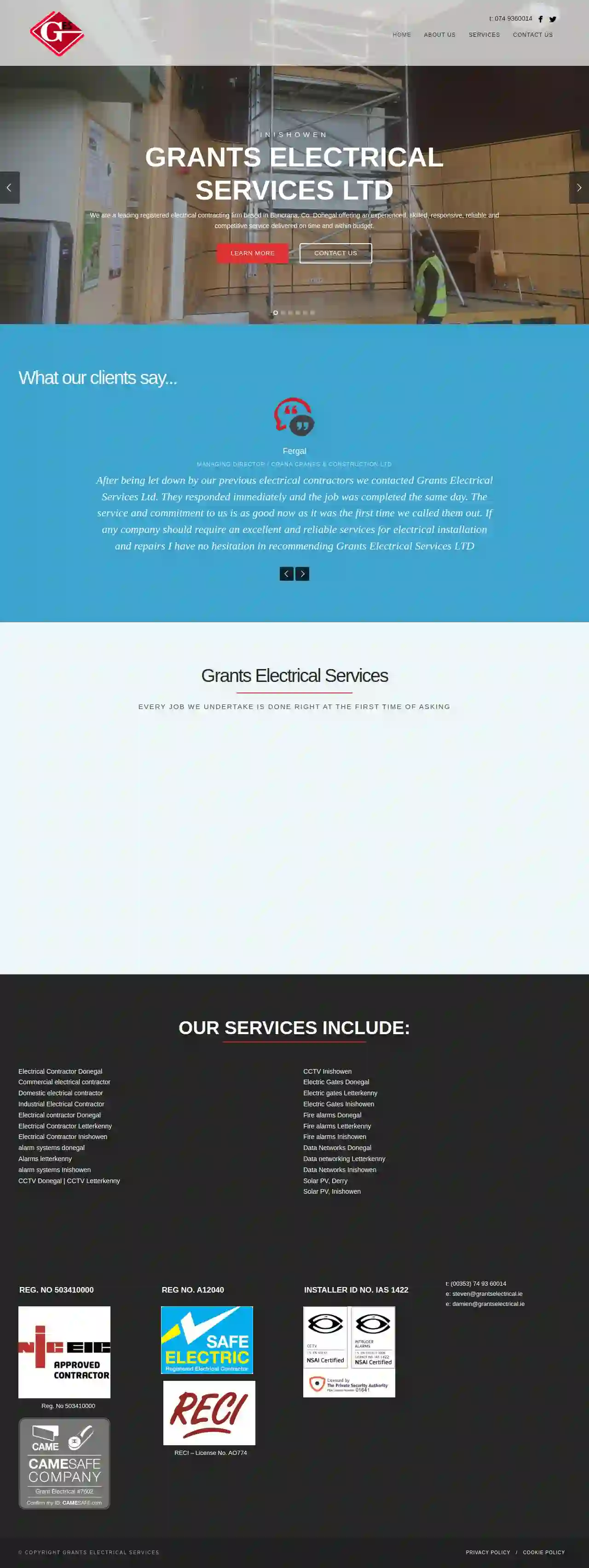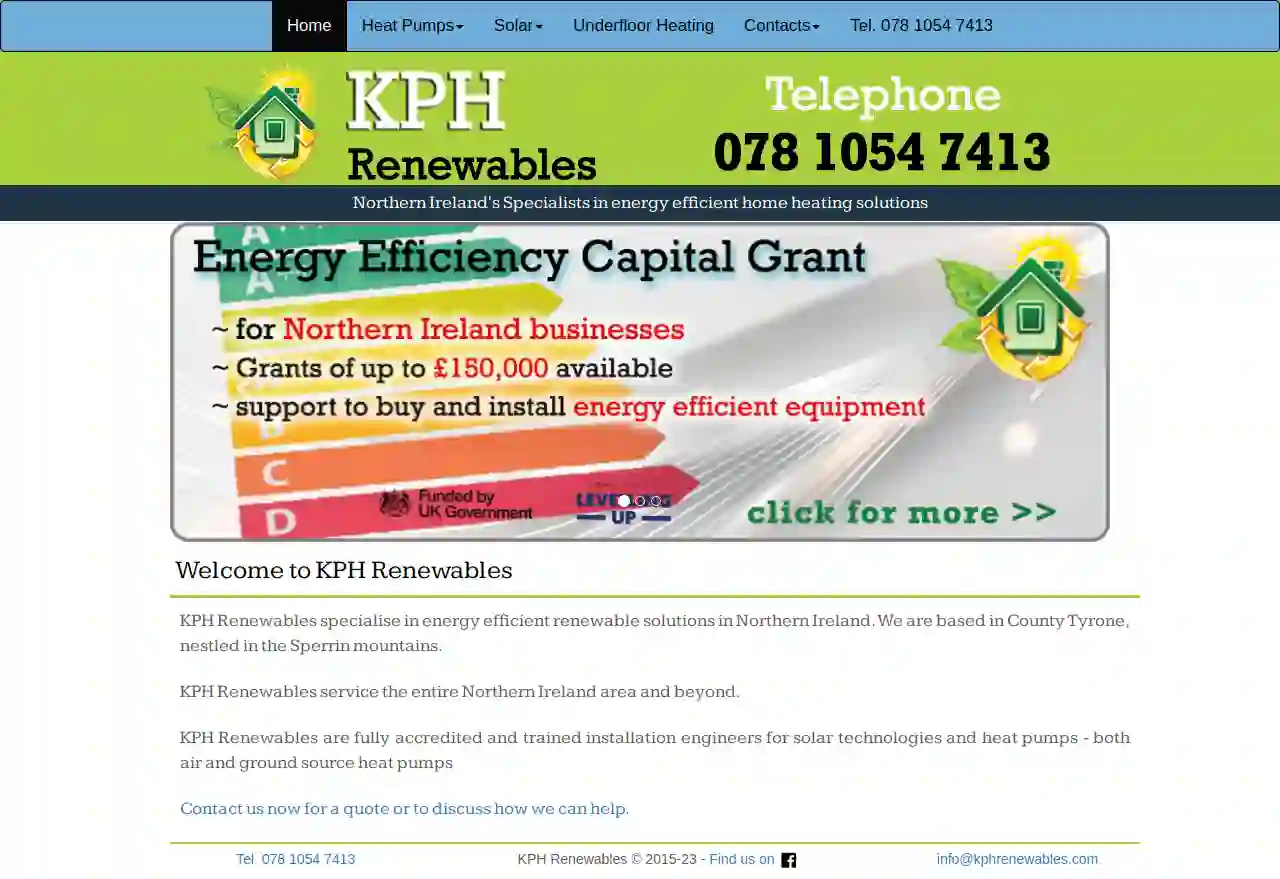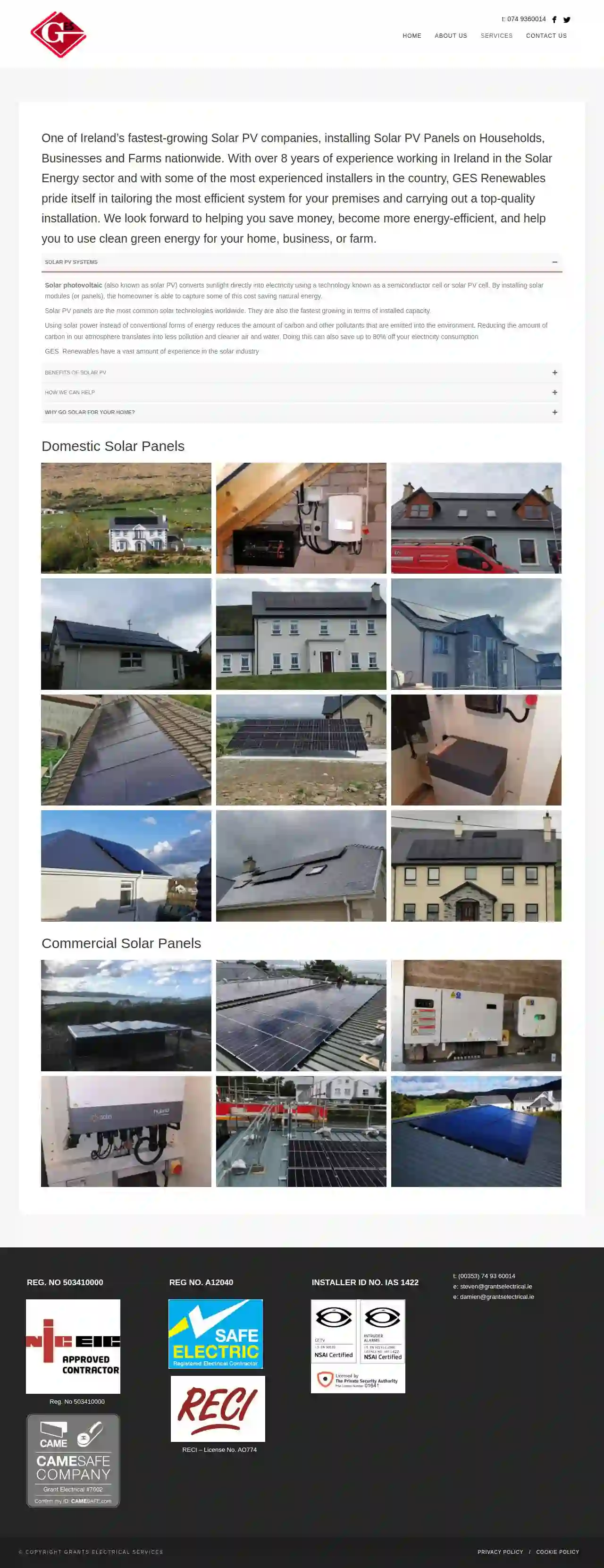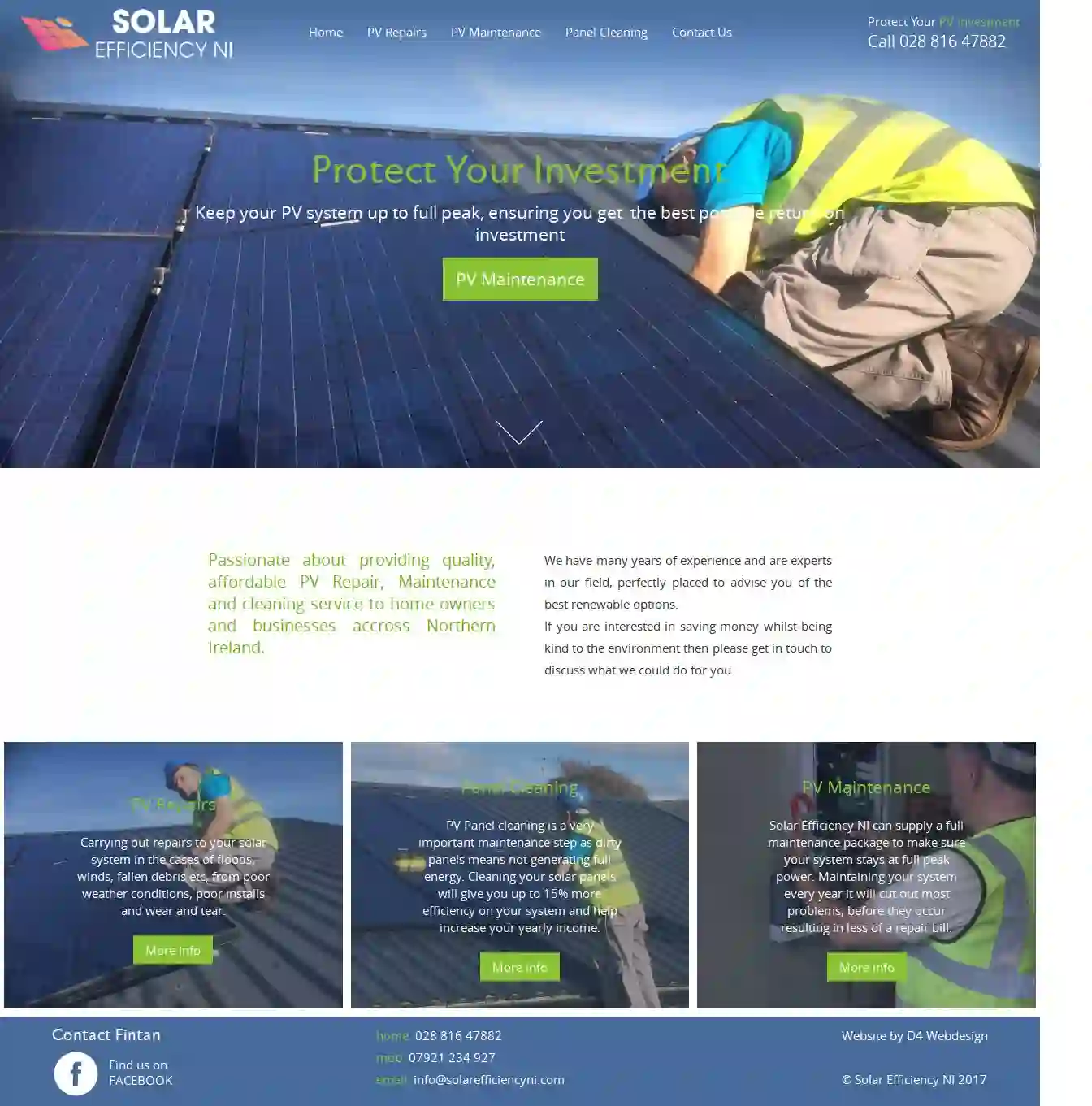Solar Installers Brierley Hill
Top 10 Solar Installers in Brierley Hill
Get up to 3 Solar Installers quotes for your project today! Compare profiles, reviews, accreditations, portfolio, etc... and choose the best offer.

Grants Electrical Services Ltd
53 reviewsBuncrana, GBGrants Electrical Services Ltd is a leading registered electrical contracting firm based in Buncrana, Co. Donegal. They offer an experienced, skilled, responsive, reliable, and competitive service delivered on time and within budget. Specialising in industrial, domestic, and commercial electrical contracting, Grants Electrical Services guarantees a high-quality service and dedicated customer care at costs you can afford. The firm works in all areas of the electrical industry, catering for everything from burglar alarm and CCTV systems installation to access control and computer networking.
- Services
- Why Us?
- Accreditations
- Our Team
- Testimonials
- Gallery
Get Quote
KPH Renewables
51 reviewsLye, GBWelcome to KPH Renewables, Northern Ireland's Specialists in energy efficient home heating solutions. We are based in County Tyrone, nestled in the Sperrin mountains. KPH Renewables service the entire Northern Ireland area and beyond. KPH Renewables are fully accredited and trained installation engineers for solar technologies and heat pumps - both air and ground source heat pumps. Contact us now for a quote or to discuss how we can help. Tel. 078 1054 7413 KPH Renewables © 2015-23 - Find us on [email protected].
- Services
- Why Us?
- Gallery
Get Quote
Project Zero Carbon
55 reviews8 Queen Street, Derry, BT487EF, GBAt PZC, we design, supply, and install a full range of popular brands of Photovoltaic solar Panels, Inverters & Batteries. Our solar panels with Black frames and Black glass blend perfectly onto the roof of your home. We're committed to reducing CO2 emissions and saving our kids' planet. It's in our hands. With our expertise and high-quality products, you can reduce your emissions and make a positive impact on the environment. Contact us today to learn more and receive a FREE solar financial report for your home.
- Services
- Why Us?
- Gallery
Get Quote
Smart Solar Panels Northern Ireland & UK
53 reviewsBALLYORE BUSINESS PARK, Newbuildings, BT472TH, GBWelcome to Smart Solar Panels Northern Ireland, your top choice for solar panels, EV charging points, and battery storage solutions. Based in Derry ~ Londonderry - We cater to residential and commercial Solar Panel clients across Northern Ireland and NI. Our dedicated team assists customers in reducing their carbon footprint and saving money with our solar energy products. Get A Quote. SOLAR PANELS NIFOR HOME Learn More. SOLAR PANELSFOR COMMERCIAL Learn More. EV CHARGERSELECTRIC VEHICLE NORTHERN IRELAND Learn More. SOLAR PANELS NORTHERN IRELAND & NI ... YOU GET CLEAN, SAFE & RENEWABLE ENERGY. BASED IN DERRY LONDONDERRY WE OFFER OUR SOLAR PANEL SERVICES TO CUSTOMERS IN DERRY, STRABANE, OMAGH, LIMAVADY, DUNGIVEN, MAGHERAFELT, COOKSTOWN, COLERAINE, PORTRUSH, ANTRIM & ACROSS NI. SOLAR PANELS NORTHERN IRELANDEV CHARGEPOINT & BATTERY STORAGE SPECIALISTS We offer solar panel systems as standalone or with battery storage options. Battery storage allows efficient energy use even during low-light conditions. Additionally, we assist with grid export so you can sell surplus energy back to the grid. Our solar panel installers are available throughout the region. CONTACT US SOLAR PANEL INSTALLERS NORTHERN IRELAND Based in Derry ~ Londonderry, Northern Ireland, we provide comprehensive solar panel installation services. Our professional installers ensure a smooth process, helping you start saving on energy costs immediately. We are a leading supplier of solar energy solutions in Northern Ireland, serving customers in Derry, Londonderry, Limavady, Strabane, Omagh, Belfast, Antrim, Bangor and across the region. Our high-quality solar panels come from reputable manufacturers, ensuring efficiency and durability. We also provide a variety of EV charging solutions for electric vehicle owners. For those interested in storing excess solar energy, we offer several battery storage options to suit your needs. Solar panels are a wise investment for the future, as traditional fuel costs continue to rise. Contact us today to start your solar panel journey. Our skilled team can install solar panel systems, EV charging points, and battery storage solutions throughout Northern Ireland, Ireland, and the UK. Thank you for considering Smart Solar Panels for your renewable energy requirements. Contact us today to learn how we can help you transition to a more sustainable, eco-friendly future. Check us out on Facebook, Instagram & Tik Tok SOLAR PANEL PRICE NORTHERN IRELAND (NI) WHAT IS THE COST OF SOLAR PANELS IN NORTHERN IR
- Services
- Why Us?
- Gallery
Get Quote
C2 Energy Ltd
4.17 reviews2 Tullyverry Drive, BT47 3YG, GBRenewable Energy Suppliers in Ireland. Specialists in Underfloor Heating with our own brand of Underfloor Heating Products. We can help you save money on your energy costs with our specialism in Renewable Energy. Leave us a message. Our Services Underfloor Heating Heat Pumps Solar Thermal. Services & Products Warmth from the ground up – expert underfloor heating solutions for Ireland. Our underfloor heating specialists provide tailored solutions from our own underfloor heating brand that distribute heat evenly, creating a comfortable and energy-efficient home environment. With years of experience, we guarantee high-quality installations, reliable maintenance and exceptional customer service, all delivered with a personal touch. Trust us to keep your feet warm and your home cozy all year round. Find out more. What We Do Established in 2010, our focus back then was to supply Northern Ireland with underfloor heating pipes. Our focus now is providing products within the renewable energy sector. Helping to keep costs down, requiring little to no maintenance. As a company, we are renowned for providing good customer service. About the company If you’re in Coleraine, Belfast, Omagh, Cookstown, Derry/Londonderry, Armagh, Lisburn, Newry, Downpatrick, Donegal, or further afield. We offer a design, supply & install on a range of energy-saving products throughout Northern Ireland (NI) and Southern Ireland to all sectors: – Domestic – Commercial – Plumbers – Wholesale – Mechanical & Electrical Consultants – Housing association contractors What Our Clients Say About Us KeithQuality underfloor heating system Hi, we used C2 energy for our new build. We were very happy with all aspects of the process when working with C2 energy from initial quotes and options available, through to the quality and methods of laying the underfloor pipe, commissioning and training on the system. If they said they were coming on a certain day then they came, not something that happens a lot in the construction game but helps you keep to a schedule. All in all, we would recommend underfloor and renewable heating done by C2 energy to anyone considering it. WendyFirst-class quality service Excellent service. No problem is too much trouble. Fast reliable service. Highly recommended. Will be using c2 energy for my future renewable energy needs. GerardHighly recommended by satisfied customers. C2 Energy installed an underfloor heating conversion in our property, and I could not recommend them highly enough. Terence is an expert in this field and provided expert advice & guidance from start to finish. Communication was excellent with any o
- Services
- Why Us?
- Testimonials
- Gallery
Get Quote
Fiesta Solar
1 Springrowth Business Park, L'Derry, BT48 0LY, GBFiesta Solar is a leading provider of solar PV installations, battery storage, EV charging, and electrical testing services in Northern Ireland. We are committed to providing our customers with high-quality products, expert installation, and competitive pricing. Our team has years of experience in the industry and is fully qualified to design and install solar systems that meet your specific needs. We believe that everyone should have access to affordable, clean energy, and we are dedicated to helping our customers save money on their energy bills while reducing their carbon footprint. At Fiesta Solar, we use only the highest quality solar panels and equipment from reputable manufacturers. Our installations are designed to be durable, reliable, and efficient. We also offer a range of financing options to make solar energy more accessible to our customers. We are proud to be a trusted partner for businesses and homeowners in Northern Ireland. Our commitment to customer satisfaction is reflected in our many positive testimonials. Contact us today to learn more about how Fiesta Solar can help you save money and go green.
- Services
- Why Us?
- Accreditations
- Gallery
Get Quote
HS Renewables
539 reviewsLondonderry, Northern Ireland, 5 Derryview, BT47 6XG, GBHS Renewables is a comprehensive solution provider for sustainable energy needs. We offer a diverse range of services, including wind turbine installation, solar photovoltaic (PV) systems, battery storage, renewable heat solutions, off-grid energy systems, electric vehicle (EV) charging stations, and general electrical services. We also perform thorough testing and commissioning of all our installations to ensure optimal performance.
- Services
- Why Us?
- Accreditations
- Our Team
- Testimonials
- Gallery
Get Quote
Solar Panels Donegal
Unit 2, Tooban Industrial Estate, Burnfoot, Co. Donegal., GBGrants Electrical Services Ltd is a leading registered electrical contracting firm based in Buncrana, Co. Donegal. They offer an experienced, skilled, responsive, reliable and competitive service delivered on time and within budget. Specialising in industrial, domestic and commercial electrical contracting, Grants Electrical Services guarantees a high-quality service and dedicated customer care at costs you can afford. The firm works in all areas of the electrical industry, catering for everything from burglar alarm and CCTV systems installation to access control and computer networking.
- Services
- Why Us?
- Accreditations
- Our Team
- Testimonials
- Gallery
Get Quote
SOLAR EFFICIENCY NI FintanO'Kane
51 reviewsLye, GBProtect Your Investment Keep your PV system up to full peak, ensuring you get the best possible return on investment PV Maintenance Home Passionate about providing quality, affordable PV Repair, Maintenance and cleaning service to home owners and businesses accross Northern Ireland. We have many years of experience and are experts in our field, perfectly placed to advise you of the best renewable options. If you are interested in saving money whilst being kind to the environment then please get in touch to discuss what we could do for you. PV Repairs Carrying out repairs to your solar system in the cases of floods, winds, fallen debris etc, from poor weather conditions, poor installs and wear and tear. More info Panel Cleaning PV Panel cleaning is a very important maintenance step as dirty panels means not generating full energy. Cleaning your solar panels will give you up to 15% more efficiency on your system and help increase your yearly income. More info PV Maintenance Solar Efficiency NI can supply a full maintenance package to make sure your system stays at full peak power. Maintaining your system every year it will cut out most problems, before they occur resulting in less of a repair bill. More info
- Services
- Why Us?
- Our Team
- Gallery
Get Quote
HDPV Solar Energy
Brockagh, St. Johnston, Co. Donegal, F93Y2N8, GBHDPV Solar is a leading provider of solar PV solutions for residential homes, farming and agriculture, businesses, and commercial and public educational buildings. Our mission is to provide top-quality solar PV solutions to our clients, helping them to make the switch to clean, renewable energy and reduce their carbon footprint. We offer a wide range of solar PV solutions and our team of SEAI approved professionals provides installation, servicing, and maintenance services to ensure your solar system operates at maximum efficiency for years to come.
- Services
- Why Us?
- Testimonials
- Gallery
Get Quote
Over 3,485+ Solar Installers on our directory
Our solar companies operate in Brierley Hill and beyond!
SolarCompaniesHub has curated and vetted Top Solar Companies arround Brierley Hill. Find a top & trustworthy contractor today.
Frequently Asked Questions About Solar Installers
- String Inverters: Connect multiple panels in a series (a 'string'). A cost-effective option for simple systems, but a single panel issue can affect the entire string.
- Microinverters: Attach to each individual solar panel, maximizing energy production even if some panels are shaded. They are more expensive but offer greater efficiency and monitoring capabilities.
- Power Optimizers: Similar to microinverters, but less expensive. They optimize the output of each panel and provide individual panel monitoring, but a central inverter is still required.
- Hybrid Inverters: Combine a solar inverter with a battery charge controller, allowing for seamless integration of battery storage.
- Cash Purchase: The most straightforward option, providing the greatest long-term savings but requiring a larger upfront investment.
- Solar Loans: Loans specifically designed for solar installations, often with favorable terms and interest rates.
- Solar Leases: A third-party company owns the system and leases it to you, allowing you to go solar with little or no upfront cost, but you won't own the system or receive tax benefits.
- Power Purchase Agreements (PPAs): Similar to leases, but you pay for the electricity generated by the system, not the system itself.
- Home Equity Loans or Lines of Credit: Borrow against the equity in your home.
- System size
- Roof complexity
- Weather conditions
- Permitting and inspections
- Installer's schedule
What are the different types of solar inverters?
How can I finance my solar panel installation?
How long does it take to install solar panels?
Do solar panels increase my home value?
What are the different types of solar inverters?
- String Inverters: Connect multiple panels in a series (a 'string'). A cost-effective option for simple systems, but a single panel issue can affect the entire string.
- Microinverters: Attach to each individual solar panel, maximizing energy production even if some panels are shaded. They are more expensive but offer greater efficiency and monitoring capabilities.
- Power Optimizers: Similar to microinverters, but less expensive. They optimize the output of each panel and provide individual panel monitoring, but a central inverter is still required.
- Hybrid Inverters: Combine a solar inverter with a battery charge controller, allowing for seamless integration of battery storage.
How can I finance my solar panel installation?
- Cash Purchase: The most straightforward option, providing the greatest long-term savings but requiring a larger upfront investment.
- Solar Loans: Loans specifically designed for solar installations, often with favorable terms and interest rates.
- Solar Leases: A third-party company owns the system and leases it to you, allowing you to go solar with little or no upfront cost, but you won't own the system or receive tax benefits.
- Power Purchase Agreements (PPAs): Similar to leases, but you pay for the electricity generated by the system, not the system itself.
- Home Equity Loans or Lines of Credit: Borrow against the equity in your home.
How long does it take to install solar panels?
- System size
- Roof complexity
- Weather conditions
- Permitting and inspections
- Installer's schedule